Why will an anion gap - Study guides, Class notes & Summaries
Looking for the best study guides, study notes and summaries about Why will an anion gap? On this page you'll find 379 study documents about Why will an anion gap.
Page 2 out of 379 results
Sort by
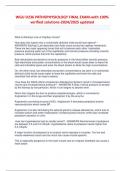
-
WGU D236 PATHOPHYSIOLOGY FINAL EXAM-with 100% verified solutions-2024/2025 updated
- Exam (elaborations) • 32 pages • 2024
- Available in package deal
-
- $15.49
- + learn more
WGU D236 PATHOPHYSIOLOGY FINAL EXAM-with 100% verified solutions-2024/2025 updated What is Starling's Law of Capillary forces? How does this explain why a nutritionally deficient child would have edema? - ANSWERS Starling's Law describes how fluids move across the capillary membrane. There are two major opposing forces that act to balance each other, hydrostatic pressure (pushing water out of the capillaries) and osmotic pressure (including oncontic pressure, which pushes fluid int...
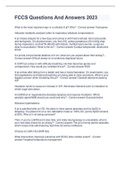
-
FCCS Questions And Answers 2023
- Exam (elaborations) • 34 pages • 2023
- Available in package deal
-
- $10.99
- 1x sold
- + learn more
What is the most important sign in a critically ill pt? Why? - Correct answer-Tachypnea Indicates metabolic acidosis (often w/ respiratory alkalosis compensation) A pt misses dialysis for a few days and comes in with fluid overload. He's tachycardic and tachypneic. On physical exam, you find JVD, pulsus paradoxus (20 mmHg drop during inspiration), and HoTN (80/40) with distant, muffled heart sounds. Lungs are clear to auscultation. What is the dx? - Correct answer-Cardiac tamponade; obstru...

-
WGU pathophysiology D236 study guide Certification Exam answers verified
- Exam (elaborations) • 33 pages • 2024
-
Available in package deal
-
- $17.99
- + learn more
WGU pathophysiology D236 study guide Certification Exam answers verified What is Starling's Law of Capillary forces? How does this explain why a nutritionally deficient child would have edema? - CORRECT ANSWER-Starling's Law describes how fluids move across the capillary membrane. There are two major opposing forces that act to balance each other, hydrostatic pressure (pushing water out of the capillaries) and osmotic pressure (including oncontic pressure, which pushes fluid into th...
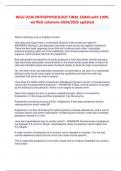
-
WGU D236 PATHOPHYSIOLOGY FINAL EXAM-with 100% verified solutions-2024/2025 updated
- Exam (elaborations) • 32 pages • 2024
- Available in package deal
-
- $13.99
- + learn more
WGU D236 PATHOPHYSIOLOGY FINAL EXAM-with 100% verified solutions-2024/2025 updated What is Starling's Law of Capillary forces? How does this explain why a nutritionally deficient child would have edema? - ANSWERS Starling's Law describes how fluids move across the capillary membrane. There are two major opposing forces that act to balance each other, hydrostatic pressure (pushing water out of the capillaries) and osmotic pressure (including oncontic pressure, which pushes fluid int...
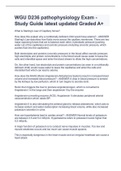
-
WGU D236 pathophysiology Exam -Study Guide latest updated Graded A+
- Exam (elaborations) • 32 pages • 2022
-
- $12.99
- 2x sold
- + learn more
What is Starling's Law of Capillary forces? How does this explain why a nutritionally deficient child would have edema? - ANSWER Starling's Law describes how fluids move across the capillary membrane. There are two major opposing forces that act to balance each other, hydrostatic pressure (pushing water out of the capillaries) and osmotic pressure (including oncontic pressure, which pushes fluid into the capillaries). Both electrolytes and proteins (oncontic pressure) in the blood affe...
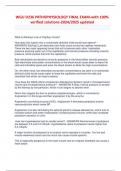
-
WGU D236 PATHOPHYSIOLOGY FINAL EXAM-with 100% verified solutions-2024/2025 updated
- Exam (elaborations) • 32 pages • 2024
- Available in package deal
-
- $17.99
- + learn more
WGU D236 PATHOPHYSIOLOGY FINAL EXAM-with 100% verified solutions-2024/2025 updated What is Starling's Law of Capillary forces? How does this explain why a nutritionally deficient child would have edema? - ANSWERS Starling's Law describes how fluids move across the capillary membrane. There are two major opposing forces that act to balance each other, hydrostatic pressure (pushing water out of the capillaries) and osmotic pressure (including oncontic pressure, which pushes fluid int...
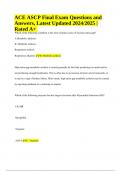
-
ACE ASCP Final Exam Questions and Answers, Latest Updated 2024/2025 | Rated A+
- Exam (elaborations) • 225 pages • 2024
-
- $17.49
- + learn more
ACE ASCP Final Exam Questions and Answers, Latest Updated 2024/2025 | Rated A+. Which of the following condition is the most common cause of increase anion gap? A.Metabolic alkalosis B. Metabolic acidosis Respiratory acidosis Respiratory alkalosis B. Metabolic acidosis High anion gap metabolic acidosis is caused generally by the body producing too much acid or not producing enough bicarbonate. This is often due to an increase in lactic acid or ketoacids, or it may be a sign of kidney fail...
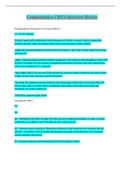
-
Comprehensive CRNA Interview Review Accurate responses are given.
- Presentation • 70 pages • 2023
-
- $18.99
- 3x sold
- + learn more
Comprehensive CRNA Interview Review Accurate responses are given. Comprehensive CRNA Interview Review Norepinephrine Mechanism of Action (MOA) A1, A2, B1 agonist. Primary agent used in distributive shock because it's ability to recruit venous volume and augment preload, while increasing arterial tone, and increasing cardiac output. Alpha one causing peripheral smooth muscle contraction. (low dose venous, high dose venous and arterial). Alpha 2 adrenoreceptor agonism actually ant...
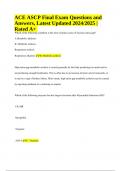
-
ACE ASCP Final Exam Questions and Answers, Latest Updated 2024/2025 | Rated A+.
- Exam (elaborations) • 225 pages • 2024
-
- $15.49
- + learn more
ACE ASCP Final Exam Questions and Answers, Latest Updated 2024/2025 | Rated A+. Which of the following condition is the most common cause of increase anion gap? A.Metabolic alkalosis B. Metabolic acidosis Respiratory acidosis Respiratory alkalosis B. Metabolic acidosis High anion gap metabolic acidosis is caused generally by the body producing too much acid or not producing enough bicarbonate. This is often due to an increase in lactic acid or ketoacids, or it may be a sign of kidney fail...
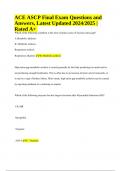
-
ACE ASCP Final Exam Questions and Answers, Latest Updated 2024/2025 | Rated A+
- Exam (elaborations) • 225 pages • 2024
-
- $16.49
- + learn more
ACE ASCP Final Exam Questions and Answers, Latest Updated 2024/2025 | Rated A+. Which of the following condition is the most common cause of increase anion gap? A.Metabolic alkalosis B. Metabolic acidosis Respiratory acidosis Respiratory alkalosis B. Metabolic acidosis High anion gap metabolic acidosis is caused generally by the body producing too much acid or not producing enough bicarbonate. This is often due to an increase in lactic acid or ketoacids, or it may be a sign of kidney fail...

Do you wonder why so many students wear nice clothes, have money to spare and enjoy tons of free time? Well, they sell on Stuvia! Imagine your study notes being downloaded a dozen times for $15 each. Every. Single. Day. Discover all about earning on Stuvia


